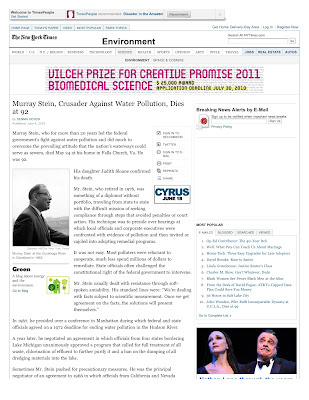This is supposed to be available at
Oregon DEQ's site but the link appears to be broken:
In This Issue
* DEQ Launches 'Oregon Carbon Calculator'
* DEQ Works to Improve Water Quality Standards
* Chemical-free Lawns Benefit Kids, Pets and Environment
DEQ Launches 'Oregon Carbon Calculator'
A new interactive tool on the DEQ website lets Oregon residents measure their carbon footprint and discover ways to improve it. The
Oregon Carbon Calculator calculates all direct and indirect greenhouse gas emissions from personal transportation, household energy use, and consumption of food, goods and services.
Find out how your household's carbon footprint compares to households of similar size and income. And learn how you can take action to reduce your carbon footprint from a number of specific ideas and strategies.
The Oregon Carbon Calculator is made possible through Oregon DEQ's support of the CoolClimate Network, a program of the University of California, Berkeley, and through financial support by the California Air Resources Board and the CoolCalifornia.org partnership. Oregon DEQ selected this calculator for its approach and depth in calculating human impacts to climate change.
DEQ Works to Improve Water Quality Standards
DEQ is responsible for establishing water quality standards and policies to protect aquatic and human life in Oregon. Staff are busy working on a number of important water quality improvement projects for Oregon, including the following:
Reducing persistent pollutants. DEQ has prepared a draft legislative report detailing sources of 118 persistent toxics in Oregon waterways and measures to help reduce them.
Public information sessions will take place throughout the state in early April. DEQ will submit the final report to the Oregon Legislature on June 1.
More information.
Upper Klamath, Lost River Subbasins. A plan to improve water quality in the Upper Klamath and Lost River subbasins is out for
public comment. Due to questions about water availability in the Klamath basin, DEQ has extended the comment period through May 27.
More information.
Turbidity standards. DEQ is updating the water quality standard addressing turbidity, a measure of water clarity. Once technical work is completed, DEQ will convene a work group and develop a revised rule on the standard – sometime in late 2011.
More information.
Standards for new fish consumption rate. DEQ continues to work with communities and other interested groups to develop new standards regulating toxic emissions into waterways to protect human health based on a higher fish consumption rate.
More information.
Willamette basin streamside habitat study. In early March, DEQ released a report estimating it could cost up to $1.2 billion to restore streamside vegetation throughout the Willamette basin. The loss in streamside vegetation -- due to pollution stemming from farming, forestry and urban activities – has resulted in increased polluted runoff into streams, leading to increased water temperature and diminished aquatic life.
View the report.
Chemical-free Lawns Benefit Kids, Pets and Environment
It may surprise you to learn that the best weed control for a lawn is provided by healthy soil, not synthetic fertilizers and herbicides. Some lawn chemicals actually kill the soil microbes necessary for a healthy lawn.
Using a "weed and feed" product to fertilize a lawn also broadcasts toxic herbicides across the entire lawn. These herbicides can stay there for weeks. Rain or watering can wash the chemicals into storm drains that lead to rivers and streams where fish are at risk. Moreover, herbicides are toxic chemicals that can be unsafe for children and pets.
There are safe and healthy ways to care for your lawn without the use of toxic herbicides. Visit DEQ’s
Healthy Lawns, Healthy Families website to learn about natural lawn care and how lawn-care habits affect water quality.
Calendar of Events
April 16: State Furlough Day. All DEQ offices and vehicle emissions inspection stations closed.
April 28-29: Oregon Environmental Quality Commission meeting, Coos Bay. Details to come.
June 18: State Furlough Day. All DEQ offices and vehicle emissions inspection stations closed.
* * *
Got Household Toxic Waste? New clickable map shows collection events throughout state
Many of us have products at home containing hazardous substances. Examples include pesticides, herbicides, solvents, paints, motor oil and antifreeze. It’s important to dispose of these products properly to avoid contaminating our water supply or threatening the health of sanitation workers.
Never dispose of household toxic trash down the sink, on the ground, down a storm drain, or in your garbage can. Instead, take your unwanted products to a household hazardous waste collection site.
You can use our online
clickable map to see when a household hazardous waste collection event will be in your area of the state.
Learn more about household hazardous waste and what you can do to minimize it in your home.
*********************
Sending this quarterly newsletter electronically rather than in hard copy format saves about 67,000 sheets of paper a year. This equals an estimated 17 million BTUs of energy and reduces greenhouse gas emissions by an estimated 2.1 metric tons of carbon dioxide equivalent (240 gallons of gasoline). Please don’t print this newsletter unless necessary.
